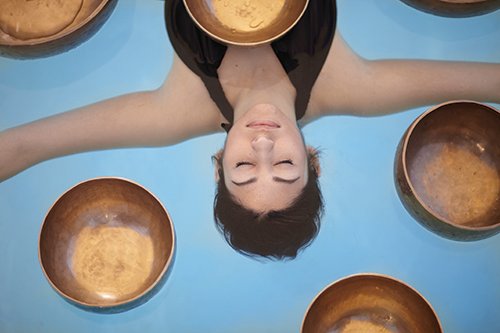
How much attention do you pay to your spa or salon’s sonic environment? Possibly not enough.
Hearing is one of the five primary senses, but businesses often seem to regard it as secondary to the other four, an afterthought, if it gets any consideration at all. Restaurants will spend countless hours crafting an incredible farm-to-table menu, then destroy the dining experience with music so loud diners can’t have a conversation. Or a hotel and/or spa might spend thousands (or hundreds of thousands) of dollars on beautiful visual spaces, and hours designing optimal touch, smell, and taste experiences – delicious food, carefully curated aromatherapy, soft as silk oils, skilled therapists – only to then throw on some stereotypically trite new age music, and figure that should do it.
This makes little sense, as sound is an essential part of the sensory experience and should get as much attention as the other sensory stimuli, if not more, because, while you can’t change your décor to appeal to every customer’s individual taste, you can change your sound offerings, and personalization is what makes the customer experience memorable.
Julian Treasure is a business sound expert and Chairman at The Sound Agency, whose mission is to help its brand clients unleash the beneficial power of designed sound.
“The definition of sound is vibration that we can hear,” says Treasure, speaking on the phone from the UK. “If you want to look at it in the biggest possible sense, vibration is life. Everything is vibrating. The little tiny strings that make up particles, that make up atoms, that make up molecules, that make up cells… at every level, we are vibrating. Stillness is death, or lack of existence.
“Given that we are a mass of vibrating energy, it’s not surprising that external vibration effects us,” he adds.
Treasure admits this is a very “cosmic” view, and says that on a more practical level, sound affects human beings in four powerful ways: physiologically, psychologically, cognitively, and behaviourally. But most of us don’t ever think about it.
“Sound affects our bodies, causes emotional reactions, affects our ability to think and changes how we behave,” says Treasure. There is evidence that listening to music can strengthen immunity, and decrease both pain and anxiety in surgery patients. (For more detail on the four ways sound affects us, see below.)
Music, says Treasure, is “the most powerful way for sound to change our emotions. For example, waltzes are reassuring. Not surprising. Your mother’s heartbeat, which is the first sound you ever heard, is a three beat. The human heartbeat is a waltz.”
In nature, birdsong is a relaxing sound associated with feeling calm and safe. “Birdsong makes us feel secure because we’ve learned that when the birds are singing things are normally safe,” Treasure explains.
Low, or descending tones are also associated with relaxation. In a separate interview, Lyz Cooper, a sound therapist and the founder of the British Academy of Sound Therapy (BAST), says, “Buddhist monks have been chanting that very deep om sound for thousands of years. Those tones actually lull the body into a trance. It’s no accident that they’ve been doing that intuitively.”
In 2012 Cooper, who created something she calls “consciously designed music,” created Weightless, a music track dubbed “the most relaxing tune ever,” in partnership with musicians Marconi Union. Weightless features guitar, piano, electronic samples of natural soundscapes, and chanting — and was said to be so effective you shouldn’t listen to it while driving. (Hear it below)
But, bringing us back to the topic of personalization – and birds – both Treasure and Cooper caution that not all sounds affect everyone the same way. People have different associations with different sounds.
“Some people have a phobia of birds,” Cooper points out, so birdsong suddenly becomes terrifying.
Some places, like the Four Seasons, Toronto, personalize the experience with a “sound menu.” Spa clients can choose between six channels like Spa Chill Vibes: “chill-out lounge music with a mid-tempo beat;” Spa Classical: “traditional classical music and modern instrumental based music;” and Spa Spiritual: “meditation & chanting.”
And many spas around the world are now exploring the effects of sounds and utilizing sound therapy techniques to enhance treatments, or as standalone therapies
Sound therapy is the passive (participating) or active (listening) use of sounds and music with the aim of a therapeutic outcome. Instruments might include Tibetan or Himalyan singing bowls, crystal singing bowls, tuning forks, gongs, and drums. BAST puts forth the idea that, as it is widely believed that many illnesses are stress related, treatment methodologies that promote relaxation and reduce stress are a potentially effective way of treating or preventing illness to prevent and treat illness.
Among the spas incorporating these techniques are Arizona’s Miraval, which offers a Himalayan Sound Bath with Master Tibetan Sound Healer, Pamela Lancaster, in which the bather floats in water while “the shamanic rhythms and harmonics of the ancient healing Himalayan water bowls are played on and around one’s body.” The therapy is described as transporting one into “deep womb-like states of weightlessness and peace.”

Yaan Wellness Spa in Tulum Mexico, features a Multi Vibrational Therapy sound healing. The treatment employs sacred shamanic instruments such as gongs, crystal and Tibetan bowls, Mayan shells, and didgeridoo. The sound waves and vibrations are said to “restore body, mind and spirit, creating a sense of balance, harmony and peace.”
Omni Bedford Springs Spa offers a therapy called “Acutonics,” in which the therapist places tuning forks on and around the body “to alleviate tension through the principals of sound healing.” (Acutonics is in fact a sound-based integrative medicine centre in New Mexico)
And Lush Spas, with locations in the UK and the US, also offer sound baths, using tuning forks, singing bowls, and music.
At the other end of the spectrum is silence, a new trend identified in the Global Wellness Institute’s recent 8 Wellness Trends for 2017 – and Beyond. There is growing evidence that exposure to silence can be beneficial. For example, in a 2013 study, Duke University regenerative biologist Imke Kirste found that two hours of silence per day prompted cell development in the hippocampus — the brain region related to the formation of memory involving the senses — in mice.
Vamed Vitality World opened a “Silent Spa” at Austria’s Therme Laa Hotel & Spa in December 2016. With the exception of check in and the restaurant, the bathing and spa experience is completely silent.
What are some things spa owners and managers can consider when it comes to enhancing the soundscapes of their properties?
Julian Treasure advises giving people choice. “Imposing sound on people is not really a good idea. We all have different associations, different likes . My favourite track might be noise to you or vice versa.” He also advises getting a good sound system, which might seem obvious but he says, “I can’t count how many times I’ve been to places that are playing music on some rubbishy boom box in the corner.”
Cooper, meanwhile, is thrilled to see the spa industry embracing sound therapy.
“It’s so exciting,” she says. “I know I’m biased but I believe that if more spas incorporated sound therapy and paid more attention to the design of their music and their sound environment it would take what they offer to another level. I’m biased but I honestly believe that.”
The Four Ways In Which Sound Affects Humans, according to Julian Treasure
Physiologically. “Sounds affects our bodies. Sudden sounds, for example, create an immediate fight or flight response. Sounds can slow you down as well. Gentle surf is a very restful sound. It’s very similar to the breathing of a sleeping human being and a sound we associate with being relaxed and having not a care in the world. Your breathing, heart rate, hormone secretions, brain waves, they can all be effected by sound outside you. If I drop you in a night club with pounding music at 120 beats per minute, your heartrate will accelerate immediately. If I put you in a spa with extremely relaxing sound, your heartrate will slow.”
Psychologically. “A lot of this is down to association. Sounds cause emotional reactions, both individually and universally. People have visceral reactions to things like calls to action: a telephone ringing is irritating because it’s a call to action. A baby crying next to you on a plane is a nightmare because we know almost at a genetic level that something needs to be done and we can’t do it. So there’s a stress reaction.”
Cognitively. “It’s much harder to think in noise, especially if that noise contains other people’s conversation. You have no “earlids.” Your ears are working 24 hours a day. If you’re trying to write something and there’s somebody talking next to you it is very difficult. They are taking up crucial bandwidth that you want to use for listening to the voice in your head. We have bandwidth for about 1.6 human conversations. We can’t understand two people talking at the same time.”
Behaviourally. “Jarring loud sound will change your behaviour for the worse. We get less social, more irritable, more fatigued, more stressed. Relaxing sound will slow us down and make us gentler. The Sound Agency installed a soundscape on a half mile pedestrian strip in Lancaster, California. Featuring gentle water, birdsong, and music. In the weeks following the installation, crime in the area dropped by 15%.”



